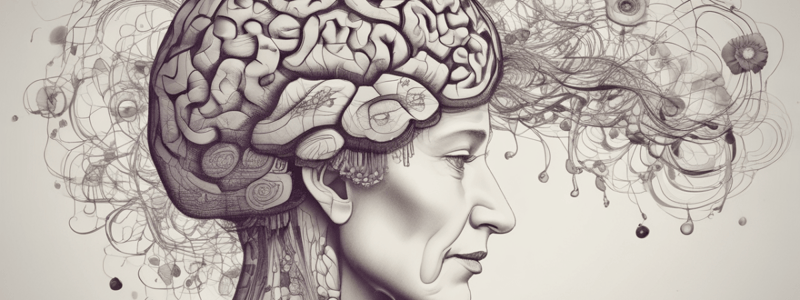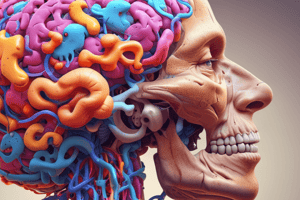Podcast
Questions and Answers
What is Alzheimer's disease?
What is Alzheimer's disease?
- A brain disorder that does not affect memory
- A brain disorder that gets worse over time (correct)
- A brain disorder that only affects social skills
- A brain disorder that gets better over time
What is the most common cause of dementia?
What is the most common cause of dementia?
- Alzheimer's disease (correct)
- Cancer
- Huntington's disease
- Parkinson's disease
What is the genetic basis of Early-Onset Alzheimer's Disease?
What is the genetic basis of Early-Onset Alzheimer's Disease?
- X-linked inheritance
- Polygenic
- Monogenic (correct)
- Autosomal recessive
Which gene is known to cause Early-Onset Alzheimer's Disease?
Which gene is known to cause Early-Onset Alzheimer's Disease?
What is the most significant genetic risk factor for Late-Onset Alzheimer's Disease?
What is the most significant genetic risk factor for Late-Onset Alzheimer's Disease?
What is the pathophysiology of Alzheimer's Disease characterized by?
What is the pathophysiology of Alzheimer's Disease characterized by?
What is the primary risk factor for Alzheimer's disease?
What is the primary risk factor for Alzheimer's disease?
What is the result of hyperphosphorylation of tau protein?
What is the result of hyperphosphorylation of tau protein?
What is the result of mutations in the APP gene?
What is the result of mutations in the APP gene?
What is the inheritance pattern of mutations in the PSEN1 and PSEN2 genes?
What is the inheritance pattern of mutations in the PSEN1 and PSEN2 genes?
What is the correlation between synaptic loss and cognitive decline?
What is the correlation between synaptic loss and cognitive decline?
What is the effect of chronic activation of the immune system in the brain?
What is the effect of chronic activation of the immune system in the brain?
What is the percentage of individuals affected by Alzheimer's disease over the age of 65?
What is the percentage of individuals affected by Alzheimer's disease over the age of 65?
What is the leading cause of death in adults over 65 years of age?
What is the leading cause of death in adults over 65 years of age?
What is the effect of amyloid plaques and tau tangles on synaptic function?
What is the effect of amyloid plaques and tau tangles on synaptic function?
What is the increased risk of Alzheimer's disease associated with?
What is the increased risk of Alzheimer's disease associated with?
Where are higher rates of Alzheimer's disease observed?
Where are higher rates of Alzheimer's disease observed?
What is the primary method of diagnosing Alzheimer's disease?
What is the primary method of diagnosing Alzheimer's disease?
What is the purpose of a Computerized Tomography (CT) scan in Alzheimer's diagnosis?
What is the purpose of a Computerized Tomography (CT) scan in Alzheimer's diagnosis?
What is the goal of Cholinesterase Inhibitors in Alzheimer's treatment?
What is the goal of Cholinesterase Inhibitors in Alzheimer's treatment?
What is a common oral health issue in Alzheimer's patients due to medication side effects?
What is a common oral health issue in Alzheimer's patients due to medication side effects?
What is a dental management challenge in Alzheimer's patients?
What is a dental management challenge in Alzheimer's patients?
What is a consequence of poor oral hygiene in Alzheimer's patients?
What is a consequence of poor oral hygiene in Alzheimer's patients?
What is a potential cause of mouth ulcers in Alzheimer's patients?
What is a potential cause of mouth ulcers in Alzheimer's patients?
Flashcards are hidden until you start studying
Study Notes
Alzheimer's Disease
- Alzheimer's disease is a brain disorder that gets worse over time, characterized by changes in the brain that lead to the deposit of proteins, causing brain shrinkage and eventual death.
- It is the most common cause of dementia, a gradual deterioration in memory, thinking ability, behavioral and social skills.
Genetic Basis
- Alzheimer's disease can be classified into two main types: Early-Onset Alzheimer's Disease (EOAD) and Late-Onset Alzheimer's Disease (LOAD).
- EOAD is characterized by mutations in three key genes: APP (Amyloid Precursor Protein), PSEN1 (Presenilin 1), and PSEN2 (Presenilin 2), which affect the gamma-secretase complex and increase amyloid-beta production.
- LOAD is influenced by multiple genes and interactions with environmental factors, with the most significant genetic risk factor being the APOE ε4 allele.
Pathophysiology
- Abnormal processing of APP by beta and gamma-secretases produces amyloid-beta peptides, which aggregate to form extracellular amyloid plaques.
- Hyperphosphorylation of tau protein leads to the formation of intracellular neurofibrillary tangles, disrupting normal function of microtubules in neurons.
- Amyloid plaques and tau tangles disrupt synaptic function, leading to a loss of synapses and neurons.
- Chronic activation of the immune system in the brain contributes to neuroinflammation, exacerbating neuronal damage and disease progression.
Epidemiology
- Alzheimer's disease affects approximately 5-10% of individuals over the age of 65, with the prevalence increasing with age.
- It is the 5th leading cause of death in adults over 65 years of age, and the 6th leading cause of death overall.
- Demographic factors that contribute to the risk of Alzheimer's disease include age, genetics, gender, and geographic variations.
Clinical Manifestations
- Cognitive decline, memory impairment, and behavioral changes are common symptoms of Alzheimer's disease.
- Poor oral hygiene, dry mouth, mouth ulcers, and gingival hyperplasia are common dental manifestations of the disease.
Diagnosis and Treatment Options
- Alzheimer's disease can be diagnosed definitively only by autopsy, but clinical suspicion can be confirmed using biomarkers and neuroimaging such as MRI, CT, and PET scans.
- Treatment options include pharmacological interventions such as cholinesterase inhibitors, and non-pharmacological interventions such as cognitive therapy, physical exercise, and lifestyle modifications.
Dental Management
- Behavioral challenges and difficulty in cooperating during dental treatments due to cognitive impairment and behavioral issues are common in individuals with Alzheimer's disease.
- Dental management should focus on addressing the unique challenges of the disease, including poor oral hygiene, dry mouth, and other oral health issues.
Studying That Suits You
Use AI to generate personalized quizzes and flashcards to suit your learning preferences.



